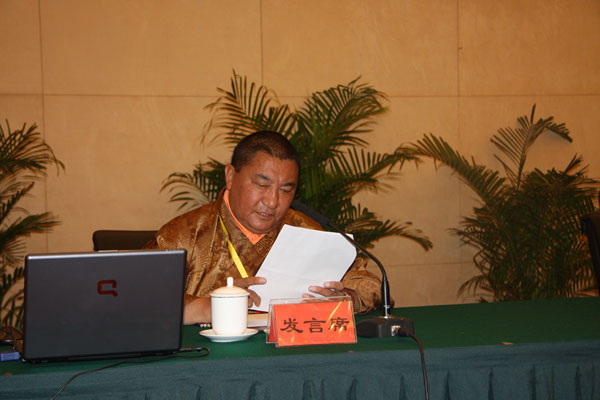Sparks have been flying recently on the issue of China’s position on “Living Buddhas”, reincarnations of a Rinpoche or tulku – a monk that has gone through the confirmation process involving religious rituals, traditional conventions and government approval.
To “help Buddhist followers to distinguish between real and fake lamas or tulkus”, China published an official online list of state-approved “Authentic Tibetan Buddhist Lamas” in China on January 18. Senior Communist Party official Zhu Weiqun explained this move, saying that “some fake Rinpoches have posed threats to national security as they use money they collect to sponsor illegal or even separatist activities in Tibet.” With this in mind, Beijing released the names, photographs and locations of 870 “verified” Buddhas on the website of the State Administration for Religious Affairs.
Drukhang Thubten Khedrup, one of the 870 “Living Buddhas”, has given his approval to this system. “As a living Buddha, I feel genuinely happy about it,” he is quoted to have said.
But this spiritual cataloguing has not been received well by Tibetans in exile or the world at large, which views it as a way to further tighten Chinese control of Tibetan affairs. “This living Buddha database and the whole policy toward reincarnation is clearly a pre-emptive move by the government to control what happens after this Dalai Lama,” said Nicholas Bequelin of Amnesty International.
It is also being seen as a way to consolidate State control of future religious appointments, including that of the next Dalai Lama’s reincarnation. According to Tibetan Buddhism, Tenzin Gyatso, the 14th and current Dalai Lama, is a reincarnation of a past lama who decided to be reborn again to continue his work. He has been based in India since fleeing Tibet after the unsuccessful 1959 uprising.
Zhu has also said that “Whoever has the name of Dalai Lama will control political power in Tibet.” This confirms the belief that Beijing sees the appointment of the next Dalai Lama as a key to control Tibet.
China’s wish to control Tibet through control of its religious figureheads is illustrated by their actions regarding the Panchen Lama, the second most senior religious leader in Tibetan Buddhism, The Chinese government has denounced Gedun Choekyi Nyima, and who was recognised as the reincarnation of the 10th Panchen Lama by the Dalai Lama following the traditional and religious procedure of appointing a reincarnation. The Chinese government abducted the boy at the age of six and in his place chose and appointed Gyaltsen Norbu, now known as the Chinese Panchen Lama who is seen in the Tibetan world as a puppet in the State’s hands.
Students for a Free Tibet (SFT), a pro-Tibet student campaigning group, mocked China’s list by carrying out a street protest in Dharamshala. SFT set up a pseudo enrollment booth where activists wore Chinese President Xi Jinping’s mask and held a list of conditions for enrollment, including “Anti-Dalai Lama”, “Pro-Chinese Communist Party”, and “Don’t even need to be a Buddhist”.
“The Chinese government may have claimed to eradicate the fake lamas. However, we see it as a politically motivated step to intervene with the reincarnation selection of the 14th Dalai Lama. This is a gross violation of religious freedom and a perverse interference in Tibetan Buddhism,” said Dorjee Tseten, SFT’s Asia Director.
SFT also organised a signature petition against the “Living Buddha list”, which will be sent to the respective offices of China and their Embassies. “China has no right in publishing such list,” concludes Tenzin Tselha, SFT National Director (India).





 Print
Print Email
Email